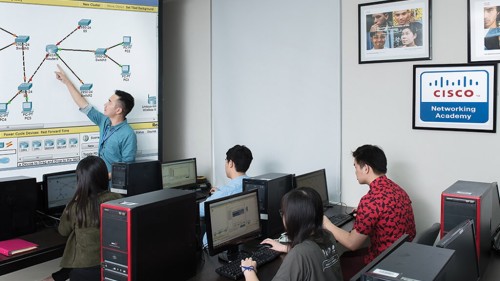Computer Networking Lab Course

Computer Networking Lab Course
Published 11/2024
Created by Shane Sunny Kottuppallil
MP4 | Video: h264, 1280x720 | Audio: AAC, 44.1 KHz, 2 Ch
Genre: eLearning | Language: English | Duration: 18 Lectures ( 3h 38m ) | Size: 2.9 GB
Cisco Packet Tracer Lab
What you'll learn
Understanding Network Fundamentals : The primary objective of this course is to provide learners with a comprehensive understanding of network fundam
Configuring Network Devices : This course equips learners with the practical skills to configure network devices like routers and switches. By working
Routing Protocols Configuration : Students will gain the ability to configure and implement different routing protocols, such as RIP, OSPF,
Network Address Translation (NAT) Setup : The course covers Network Address Translation (NAT), teaching students how to configure NAT in Cisco Packet
Requirements
The prerequisites for this course include: 1. Basic Computer Knowledge: Familiarity with operating systems, general computer usage, and basic terminology like IP addresses and network devices. 2. Understanding of Network Concepts: A foundational understanding of networking, including concepts like LAN, WAN, and basic device communication, would be helpful but not mandatory. 3. Access to Cisco Packet Tracer: The course requires Cisco Packet Tracer software for completing the hands-on exercises and labs. Ensure you have it installed before starting the course. 4. Interest in Networking: A genuine interest in networking concepts and a willingness to learn technical configurations and simulations.
Description
INTRODUCTION:This computer networking lab course is designed to provide learners with a hands-on, practical understanding of networking concepts using Cisco Packet Tracer. Through 13 comprehensive exercises, students will explore the fundamentals of computer networking, including IP addressing, subnetting, routing protocols, and device configurations. The course emphasizes practical applications, where students will configure routers, switches, and network devices, simulating real-world scenarios in a controlled environment.Learners will build and manage VLANs, set up routing protocols like RIP, OSPF, and understand how to implement Network Address Translation (NAT) for efficient network operations. Each exercise includes video tutorials and step-by-step guidance, making it easy to follow along, even for those new to networking.By the end of the course, students will have gained the skills necessary to design, configure basic networks. The practical knowledge acquired will also prepare students for more advanced networking concepts and certifications, making this course ideal for beginners and those looking to enhance their networking skills.OBJECTIVES:Understanding Network Fundamentals :The primary objective of this course is to provide learners with a comprehensive understanding of network fundamentals. Students will explore key concepts such as IP addressing, subnetting, and the operation of various network devices like routers and switches. They will gain insight into how data is transmitted across networks using the OSI model and TCP/IP protocols. Through hands-on exercises using Cisco Packet Tracer, students will simulate real-world networking environments, allowing them to visualize and troubleshoot network communication issues. They will also delve into how networks are structured, including LANs, WANs, and the internet, gaining a thorough understanding of how devices connect and interact. By mastering these fundamentals, students will develop the necessary skills to configure, manage, and troubleshoot basic networks, preparing them for more advanced networking concepts and real-world application.Configuring Network Device:This course equips learners with the practical skills to configure network devices like routers and switches. By working through lab exercises, students will learn how to set up device configurations, ensuring seamless data flow across the network. These configurations include routing protocols, VLANs, and access lists, which are essential for maintaining network efficiency and security. Students will gain hands-on experience using Cisco Packet Tracer to simulate these setups.Routing Protocols Configuration :Students will gain the ability to configure and implement different routing protocols, such as RIP, OSPF, using Cisco Packet Tracer. They will understand how routing protocols work to determine the best path for data transmission. Practical exercises will help students learn how to configure routers for these protocols, enhancing network efficiency by optimizing data routing across different segments of the network.Network Address Translation (NAT) Setup :The course covers Network Address Translation (NAT), teaching students how to configure NAT in Cisco Packet Tracer to conserve public IP addresses. Learners will understand how NAT works to translate private addresses to public ones, enabling secure and efficient internet connectivity for multiple devices on a local network.
Who this course is for
Computer Science
Networking
CIsco Packet Tracer
Network Infrastructure
Homepage
https://rapidgator.net/file/bf3710b14da47759e353c863530143fc/Computer_Networking_Lab_Course.part3.rar.html
https://rapidgator.net/file/821878603abcbf3fbce70b45f1d0b7ce/Computer_Networking_Lab_Course.part2.rar.html
https://rapidgator.net/file/1d44f26ce0dd58484a7ba54e29a91b6d/Computer_Networking_Lab_Course.part1.rar.html
